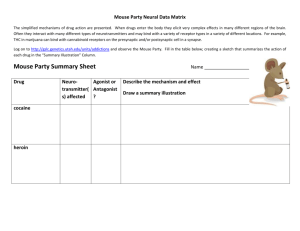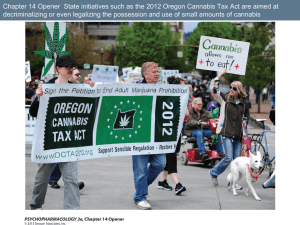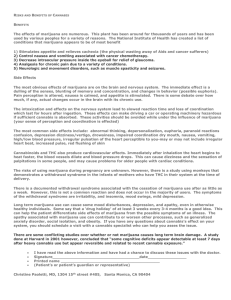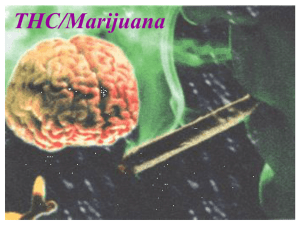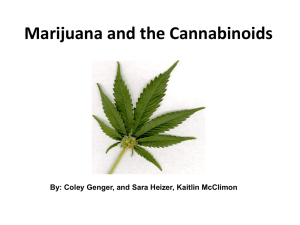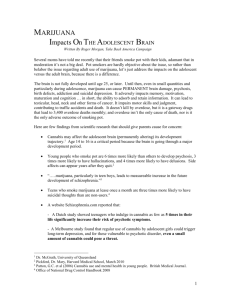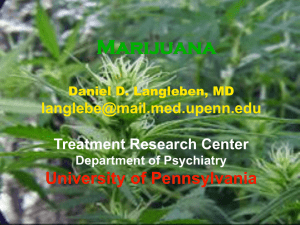Cannabinoids
advertisement
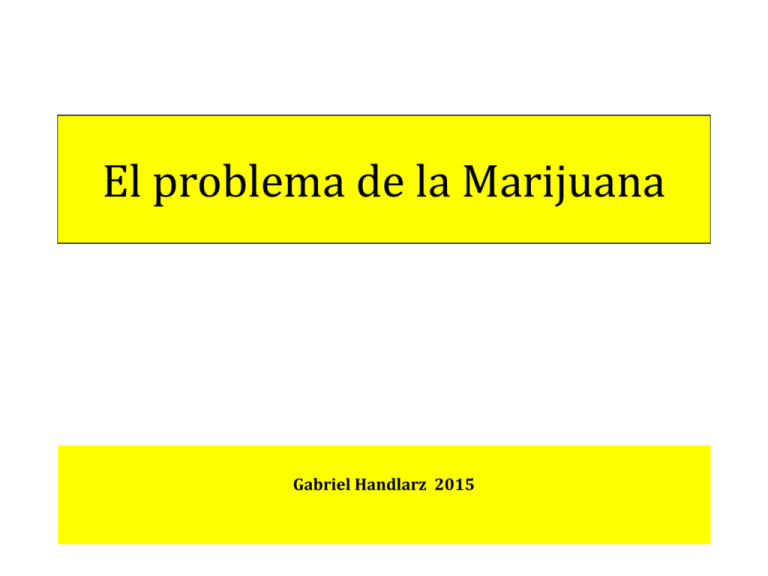
El problema de la Marijuana Gabriel Handlarz 2015 An 8000-year time line of cannabis use around the world Cannabis • • • • • cannabis is one of the oldest known psychoactive plants First reported use as medicine > 5000 years ago Introduced into Western medicine in 1840’s by Dr. W.B. O’Shaughnessy One of earliest non-food plants cultivated – fiber for rope, seeds for oil and birdseed – mixture of leaves, stems, tops – 1960’s: 1-3% THC; 1990’s: up to 8-10% • Cannabis and British Medicine • WB O’Shaughnessy, Professor of Chemistry and Medicine in the Medical College of Calcutta, Government Chemical Examiner, Knighted in 1856 (4000 miles of telegraph line) • ‘Powerful and valuable remedy in hydrophobia, tetanus, cholera and many convulsive disorders’ Cannabis • The Bengal Pharmacopoeia and General Conspectus of Medicinal Plants, (Calcutta 1844). • Provincial Medical and Surgical Journal (BMJ) • Royal Medico-Botanical Society, London February 22 1843 • Listed in U.S Pharmacopeia 1850-1941 • marijuana & hashish extracts were the 1st, 2nd, or 3rd most prescribed meds in the US from 1842-1890s gout rheumatneuralgia ism tetanus hydrophobia epidemic cholera convulsions chorea hysteria mental depression delirium tremens insanity uterine hemorrhage Cannabis for neuropathic pain…in 1906 Cannabis for Neuralgia 1925 And then along came Harry… Harry Anslinger • Had NO formal medical training • Our first drug czar • Despite being “anti-drug”, he authorized a pharmacist near the White House to supply morphine for addicted Senator Joseph McCarthy during the communist crusades. • Openly prosecuted doctors for over-prescribing, sending some to prison Single-handedly created “Reefer Madness” • Anslinger was privately funded by William Randolph Hearst who wanted to eliminate hemp as an industrial competitor • This also allowed Anslinger, an avowed racists, to rid the southwest of Hispanics • Prohibition 1937 Chemical classes Cannabinoids (66) Nitrogenous compounds (27) AminoChemical classes Cannabinoids (66) Nitrogenous compounds (27) Amino acids(18) Proteins/ enzymes (11) Sugars (34) Hydrocarbons (50) Simple alcohols (7) Simple aldehydes (12) Simple ketones (13) Simple acids (21) Fatty acids (22) Simple esters/lactones (13) Steroids (11) Terpenes (20) Non-cannabinoid phenols (25) Flavoroids (21) Vitamins (1) Pigments (2) Elements (9) Total known compounds (483) Chemical constituents of Cannabis Constituyentes de la Cannabis Sativa •Los componentes naturales identificados o aislados se han incrementado a lo largo de las ultimas décadas •1980 423 componentes •1995 485 componentes •2012 545 componentes Constituyentes del Cannabis (sativa) •∆9 -tetrahydrocannabinol (THC) •∆8 -tetrahydrocannabinol •Cannabigerol(CBG) •Cannabichromene (CBC) •Cannabidiol (CBD) •Cannabinodiol (CBND) •Cannabielsoin(CBE) •Cannabicyclol(CBL) Cannabinol (CBN) •Cannabitriol (CBT) Miscelaneus Constituyentes del Cannabis (Sativa) •Delta 9 THC tiene 18 subtipos •CBC 8 subtipos El resto son variantes siendo en total 104 cannabinoides Hay 441 componentes no cannabinoides como ser flavonoides, esteroides, fenantrenes, acidos grasos, compuestos nitrogenados Examples of Flowers from Different Clones “Bubble Gum” “Big Bud” “Dutch Northern Lights” The ingredients of cannabis •Tetrahydrocannabinol (THC) – partial agonist at CB1 •High doses cause impairment of memory and learning, •hallucinations and paranoid ideas THC attention, •Cannabidiol (CBD) – inverse agonist at CB1 •Is not hallucinogenic •Has anxiety relieving properties •Antagonises effects of THC •Antipsicotico? CBD The ingredients of cannabis •THC causes •Cannabidiol (CBD) •Impairment of attention, memory and learning •Hallucinations and paranoid ideas •Is not hallucinogenic •Has anxiety relieving properties •Antagonises effects of THC THC CBD Marijuana as Medicine Marijuana as Medicine? Therapeutic Potential: 1) Relieving pain 2) Controlling nausea 3) Stimulating appetite 4) Decreasing ocular pressure Cannabinoid-based medications: 1) Dronabinol (Marinol®) 2) Nabilone (Cesamet®) 3) Sativex® Neuroprotective effects of the nonpsychoactive cannabinoid cannabidiol in hypoxicischemic newborn piglets. Francisco J. Alvarez, Hector Lafuente, M. Carmen Rey-Santano, Victoria E. Mielgo, Elena Gastiasoro, Miguel Rueda, Roger G. Pertwee, Ana I. Castillo, Julia N Romero, and Jose Martinez-Orgado - Pediatr Res, 2008. 64(6):p. 653-8. Cannabidiol reduces brain damage and improves functional recovery after acute hypoxia-ischemia in newborn pigs. Lafuente, Alvarez, Pazos, Alvarez, Rey-Santano, Mielgo, Murgia-Esteve, Hilario, MartinezOrgado - Pediatr Res, 2011. 70(3):p.272-7 Mechanisms of cannabidiol neuroprotection in hypoxic-ischemic newborn pigs: Role of 5HT1A and CB2 receptors. Pazos, Mohammed, Lafuente, Santos, Martinez-Pinilla, Moreno, Valdizan, Romero, Pazos, Franco, Hillard, Alvarez, Martinez-Orgado - Neuropharmacology, 2013. 71:p. 28291 Diabetes/Enfermedad metabólica The cannabinoid Δ(9)-tetrahydrocannabivarin (THCV) ameliorates insulin sensitivity in two mouse models of obesity. Wargent ET, Zaibi MS, Silvestri C, Hislop DC, Stocker CJ, Stott CG, Guy GW, Duncan M, Di Marzo V, Cawthorne MA. Nutr Diabetes. 2013 May 27;3:e68. The endocannabinoid system in energy homeostasis and the etiopathology of metabolic disorders. Silvestri C, Di Marzo V. Cell Metab. 2013 Apr 2;17(4):475-90. Cannabinoids and Endocannabinoids in Metabolic Disorders with Focus on Diabetes Di Marzo V, Piscitelli F, Mechoulam R. Handb Exp Pharmacol. 2011;(203):75-104. Cannabinoids inhibit insulin receptor signalling in pancreatic β-cells Kim W, Doyle ME, Liu Z, Lao Q, Shin YK, Carlson OD, Kim HS, Thomas S, Napora JK, Lee EK, Moaddel R, Wang Y, Maudsley S, Martin B, Kulkarni RN, Egan JM. Diabetes. 2011 Apr;60(4):1198-209. A role for the putative cannabinoid receptor GPR55 in the islets of Langerhans Romero-Zerbo SY, Rafacho A, Díaz-Arteaga A, Suárez J, Quesada I, Imbernon M, Ross RA, Dieguez C, Rodríguez de Fonseca F, Nogueiras R, Nadal A, Bermúdez-Silva FJ. J Endocrinol. 2011 Nov;211(2):177-85. Inflamación/ Enfermedades digestivas Cannabidiol in inflammatory bowel diseases: a brief overview. Esposito G, Filippis DD, Cirillo C, Iuvone T, Capoccia E, Scuderi C, Steardo A, Cuomo R, Steardo L. Phytother Res. 2013 May;27(5):633-6. Beneficial effect of the non-psychotropic plant cannabinoid cannabigerol on experimental inflammatory bowel disease. Borrelli F, Fasolino I, Romano B, Capasso R, Maiello F, Coppola D, Orlando P, Battista G, Pagano E, Di Marzo V, Izzo AA. Biochem Pharmacol. 2013 May 1;85(9):1306-16. Cannabinoids mediate opposing effects on inflammation-induced intestinal permeability. Alhamoruni A, Wright KL, Larvin M, O'Sullivan SE. Br J Pharmacol. 2012 Apr;165(8):2598-610. Cannabinoid actions at TRPV channels: effects on TRPV3 and TRPV4 and their potential relevance to gastrointestinal inflammation. De Petrocellis L, Orlando P, Moriello AS, Aviello G, Stott C, Izzo AA, Di Marzo V. Acta Physiol (Oxf). 2012 Feb;204(2):255-66. Cannabidiol reduces intestinal inflammation through the control of neuroimmune axis. De Filippis D, Esposito G, Cirillo C, Cipriano M, De Winter BY, Scuderi C, Sarnelli G, Cuomo R, Steardo L, De Man JG, Iuvone T. PLoS One. 2011;6(12):e28159. Cannabis use amongst patients with inflammatory bowel disease. Lal S, Prasad N, Ryan M, Tangri S, Silverberg MS, Gordon A, Steinhart H. Eur J Gastroenterol Hepatol. 2011 Oct;23(10):891-6. Treatment of Crohn's disease with cannabis: an observational study. Naftali T, Lev LB, Yablecovitch D, Half E, Konikoff FM. Isr Med Assoc J. 2011 Aug;13(8):455-8. Impact of cannabis treatment on the quality of life, weight and clinical disease activity in inflammatory bowel disease patients: a pilot prospective study. Lahat A, Lang A, Ben-Horin S. Digestion. 2012;85(1):1-8. Gut feelings about the endocannabinoid system. Di Marzo V, Piscitelli F. Neurogastroenterol Motil. 2011 May;23(5):391-8 Oncología Enhancing the activity of cannabidiol and other cannabinoids in vitro through modifications to drug combinations and treatment schedules. Scott KA, Shah S, Dalgleish AG, Liu WM. Anticancer Res. 2013 Oct;33(10):4373-80. Cannabidiol as potential anticancer drug. Massi P, Solinas M, Cinquina V, Parolaro D. Br J Clin Pharmacol. 2013 Feb;75(2):303-12 Cannabidiol, a Non-Psychoactive Cannabinoid Compound, Inhibits Proliferation and Invasion in U87-MG and T98G Glioma Cells through a Multitarget Effect. Solinas M, Massi P, Cinquina V, Valenti M, Bolognini D, Gariboldi M, Monti E, Rubino T, Parolaro D. PLoS One. 2013 Oct 21;8(10):e76918. Cannabinoids: a new hope for breast cancer therapy? Caffarel MM, Andradas C, Pérez-Gómez E, Guzmán M, Sánchez C. Cancer Treat Rev. 2012 Nov;38(7):911-8 Towards the use of cannabinoids as antitumour agents. Velasco G, Sánchez C, Guzmán M. Nat Rev Cancer. 2012 May 4;12(6):436-44. Cannabidiol inhibits angiogenesis by multiple mechanisms. Solinas M, Massi P, Cantelmo AR, Cattaneo MG, Cammarota R, Bartolini D, Cinquina V, Valenti M, Vicentini LM, Noonan DM, Albini A, Parolaro D. Br J Pharmacol. 2012 Nov;167(6):1218-31. Sativex: Multiple Sclerosis Sativex long-term use: an open-label trial in patients with spasticity due to multiple sclerosis. Michael G. Serpell, William Notcutt, Christine Collin. J Neurol 2013;260:285-295. A questionnaire survey of patients and carers of patients prescribed Sativex as an unlicensed medicine. William G. Notcutt. Prim Health Care Res Dev. 2012 Jul 12:1-8. Assessments of blinding to treatment allocation in studies of a cannabis-based medicine (Sativex) in people with multiple sclerosis: a new apporach. S. Wright, P. Ducombe and D.G. Altman. Trials 2012; 13:189. DOI:10.1186/1745-1625-13-189. A placebo-controlled, parallel-group, randomized withdrawal study of subjects with symptoms of spasticity due to multiple sclerosis who are receiving long-term Sativex® (nabiximols). Notcutt W, Langford R, Davies P, Ratcliffe S, Potts R. Mult Scler. 2012 Feb;18(2):219-28. The evaluation of the effects of Sativex (1:1 THC BDS:CBD BDS on the inhibition of spasticity in an experimental model of multiple sclerosis. (Sativex/Baclofen). A. Hilliard, C. Stott, S.Wright, G. Guy, G. Pryce, S. Al-Izki, C. Bolton, and G. Giovannoni. International Scholarly Research Network ISRN Neurology Volume 2012;2012:802649. A randomized, double-blind, placebo-controlled, parallel-group, enriched-design study of nabiximols* (Sativex® ), as add-on therapy, in subjects with refractory spasticity caused by multiple sclerosis. Novotna A, Mares J, Ratcliffe S, Novakova I, Vachova M, Zapletalova O, Gasperini C, Pozzilli C, Cefaro L, Comi G, Rossi P, Ambler Z, Stelmasiak Z, Erdmann A, Montalban X, Klimek A, Davies P; Sativex Spasticity Study Group. Eur J Neurol. 2011 Sep;18(9):1122-31 Randomized controlled trial of Sativex to treat detrusor overactivity in multiple sclerosis. Kavia RB, De Ridder D, Constantinescu CS, Stott CG, Fowler CJ. Mult Scler. 2010 Nov;16(11):1349-59. Sativex Cancer Pain An Open-Label Extension Study to Investigate the Long-Term Safety and Tolerability of THC/CBD Oromucosal Spray and Oromucosal THC Spray in Patients With Terminal Cancer-Related Pain Refractory to Strong Opioid Analgesics. Johnson JR, Lossignol D, Burnell-Nugent M, Fallon MT. J Pain Symptom Manage. 2012 Nov 7. pii: S08853924(12)00439-3. Nabiximols for opioid-treated cancer patients with poorly-controlled chronic pain: a randomized, placebocontrolled, graded-dose trial. Portenoy RK, Ganae-Motan ED, Allende S, Yanagihara R, Shaiova L, Weinstein S, McQuade R, Wright S, Fallon MT. J Pain. 2012 May;13(5):438-49. Multicenter, double-blind, randomized, placebo-controlled, parallel-group study of the efficacy, safety, and tolerability of THC:CBD extract and THC extract in patients with intractable cancer-related pain. Johnson JR, Burnell-Nugent M, Lossignol D, Ganae-Motan ED, Potts R, Fallon MT. J Pain Symptom Manage. 2010 Feb;39(2):167-79. Cannabinoids in the management of difficult to treat pain. Russo EB. Therapeutics and Clinical Risk Management.2008;4(1):245-59. Cannabis, pain, and sleep: lessons from therapeutic clinical trials of Sativex, a cannabis-based medicine. Russo EB, Guy GW, Robson PJ. Chem Biodivers. 2007 Aug;4(8):1729-43. Sativex Neuropathic Pain A double-blind, randomized, placebo-controlled, parallel-group study of THC/CBD oromucosal spray in combination with the existing treatment regimen, in the relief of central neuropathic pain in patients with multiple sclerosis. Langford RM, Mares J, Novotna A, Vachova M, Novakova I, Notcutt W, Ratcliffe S. J Neurol. 2012 Nov 21. Cannabinoids in the management of difficult to treat pain. Russo EB. Therapeutics and Clinical Risk Management.2008;4(1):245-59. Cannabis, pain, and sleep: lessons from therapeutic clinical trials of Sativex, a cannabis-based medicine. Russo EB, Guy GW, Robson PJ. Chem Biodivers. 2007 Aug;4(8):1729-43. Oromucosal delta-9 –tetrahrdrocannabinol/cannabidiol for neuropathic pain associated with Multiple Sclerosis: An uncontrolled, open-label, 2-year extension trial. Rog D, Nurmikko TJ, Young, CA. Clinical Therapeutics. 2007;20(9):2068-2079 Randomized controlled trial of cannabis medicine in central pain due to multiple sclerosis. Rog D, Nurmikko T, et al. Neurology. 2005;65:812-819 Efficacy of two cannabis based medicinal extracts for relief of central neuropathic pain from brachial plexus avulsion: results of a randomised controlled trial. Berman JS, Symonds C, Birch R. Pain. 2004;112:299-306. Trastornos psiquiátricos Cannabinoids and Schizophrenia: Therapeutic Prospects. Robson PJ, Guy GW, Di Marzo V. Curr Pharm Des. 2013 Jun 14. [Epub ahead of print] Cannabidiol enhances anandamide signaling and alleviates psychotic symptoms of schizophrenia. Leweke FM, Piomelli D, Pahlisch F, Muhl D, Gerth CW, Hoyer C, Klosterkötter J, Hellmich M, Koethe D. Transl Psychiatry. 2012 Mar 20;2:e94 Multiple mechanisms involved in the large-spectrum therapeutic potential of cannabidiol in psychiatric disorders. Campos AC, Moreira FA, Gomes FV, Del Bel EA, Guimarães FS. Philos Trans R Soc Lond B Biol Sci. 2012 Dec 5;367(1607):3364-78. Neural mechanisms for the cannabinoid modulation of cognition and affect in man: a critical review of neuroimaging studies. Bhattacharyya S, Atakan Z, Martin-Santos R, Crippa JA, McGuire PK. Curr Pharm Des. 2012;18(32):5045-54. Cannabidiol and clozapine reverse MK-801-induced deficits in social interaction and hyperactivity in Sprague-Dawley rats. Gururajan A, Taylor DA, Malone DT. J Psychopharmacol. 2012 Oct;26(10):1317-32. Opposite effects of delta-9-tetrahydrocannabinol and cannabidiol on human brain function and psychopathology. Bhattacharyya S, Morrison PD, Fusar-Poli P, Martin-Santos R, Borgwardt S, Winton-Brown T, Nosarti C, O' Carroll CM, Seal M, Allen P, Mehta MA, Stone JM, Tunstall N, Giampietro V, Kapur S, Murray RM, Zuardi AW, Crippa JA, Atakan Z, McGuire PK. Neuropsychopharmacology. 2010 Feb;35(3):764-74. Cannabidiol, a Cannabis sativa constituent, as an antipsychotic drug. Zuardi AW, Crippa JA, Hallak JE, Moreira FA, Guimarães FS. Braz J Med Biol Res. 2006 Apr;39(4):421-9. Epilepsia Report of a parent survey of cannabidiol-enriched cannabis use in pediatric treatment-resistant epilepsy. Porter BE, Jacobson C. Epilepsy Behav. 2013 Dec;29(3):574-7. Cannabidivarin (CBDV) suppresses pentylenetetrazole (PTZ)-induced increases in epilepsy-related gene expression. Amada N, Yamasaki Y, Williams CM, Whalley BJ. PeerJ. 2013 Nov 21;1:e214. Cannabidivarin is anticonvulsant in mouse and rat. Hill AJ, Mercier MS, Hill TD, Glyn SE, Jones NA, Yamasaki Y, Futamura T, Duncan M, Stott CG, Stephens GJ, Williams CM, Whalley BJ. Br J Pharmacol. 2012 Dec;167(8):1629-42. Cannabidiol exerts anti-convulsant effects in animal models of temporal lobe and partial seizures Jones NA, Glyn SE, Akiyama S, Hill TD, Hill AJ, Weston SE, Burnett MD, Yamasaki Y, Stephens GJ, Whalley BJ, Williams CM.Seizure. 2012 Jun;21(5):344-52 Phytocannabinoids as novel therapeutic agents in CNS disorders Hill AJ, Williams CM, Whalley BJ, Stephens GJ. Pharmacol Ther. 2012 Jan;133(1):79-97 Δ⁹-Tetrahydrocannabivarin suppresses in vitro epileptiform and in vivo seizure activity in adult rats Hill AJ, Weston SE, Jones NA, Smith I, Bevan SA, Williamson EM, Stephens GJ, Williams CM, Whalley BJ. Epilepsia. 2010 Aug;51(8):1522-32. Cannabidiol displays antiepileptiform and antiseizure properties in vitro and in vivo Jones NA, Hill AJ, Smith I, Bevan SA, Williams CM, Whalley BJ, Stephens GJ. J Pharmacol Exp Ther. 2010 Feb;332(2):569-77. Cannabinoids: Anti-Seizure Efficacy Species Compound Number of discrete conditions/mo dels/designs Dose Anticonvulsan t No effect Proconvulsant THC 6 31 0.25-200 mg/kg 61% 29% 10%* CBD 2 21 1-400 mg/kg 81% 19% 0% Other plant cannabinoids 2 7 N/A 100% 0% 0% CB1 receptor agonists 2 55 N/A 73% 18% 2% (7% mixed effect) Whalley, 2014 American Herbal Pharmacopoeia Survey of 19 Pediatric Epilepsy Patients on CBD>THC • 19 children (2-16 years) used a CBD-enriched medical marijuana • 16 (84%) reduction in seizure frequency – 2 were seizure free – 8 (42%) >80% reduction in seizures – 6 had a 25-60% reduction in seizures. (Porter & Jacobson, Epilepsy & Behavior, 2013) Survey of 19 Pediatric Epilepsy Patients on CBD-enriched Cannabis • Diagnoses: Dravet syndrome (13), Doose syndrome (4), Lennox Gastaut syndrome (1), and idiopathic epilepsy (1). (Porter & Jacobson, Epilepsy & Behavior, 2013) Medical Uses? THC is more effective at blocking an enzyme that causes the brain damage common to Alzheimer's disease than approved drugs already on the market low doses of THC inhibit AChE (breaks down acetylcholine), may thus improve learning and memory. The drug also appears to prevent the formation of neurofibrillary tangles Eubanks, L.M., et al. (2006) A Molecular Link between the Active Component of Marijuana and Alzheimer's Disease Pathology, Molecular Pharmaceutics, 3, 773-777. Medical Uses? 2004 - Israeli soldiers suffering from combat stress were treated with cannabis to relieve symptoms – PTSD trials are ongoing –THC may silence genes that code for vascular endothelial growth factor (VEGF) VEGF stimulates the growth of blood vessels in tumors Does cannabis increase the risk of chronic psychotic illness? Country N Follow up OR (95% CI) Study Design Reference USA 4,494 NA 2.4 Population based Tien et al, 1990 Sweden 50,053 25 yrs 2.1 Conscript Cohort Andreasson et al, 1987 Zammit et al, 2002 Netherlands 4,045 2.8 Population based Van Os et al, 2002 Population based Weiser et al, 2002 1.8 Birthcohort Fergusson et al, 2003 3.1 Birthcohort Arsenault et al, 2002 2.8 Population based Ferdinand et al 2005 1.7 Population based Henquet et al, 2005 1.5 Population based Wiles et al, 2006 3 yrs Israel 9,724 4-15 yrs New Zealand (Christchurch) 1,265 New Zealand (Dunedin) 1,253 Netherlands 1,580 3 yrs 15 yrs 14 yrs Germany 2,436 4 yrs United Kingdom 8,580 18 months 2.0 Murray et al 2007. Nature Reviews Neuroscience 8:885-95. Marinol °: dronabinol • THC (sintético) •Aprobado por FDA el 31 de mayo de 1985 para nauseas y vómitos asociados a quimioterapia en pacientes con cáncer que no responden adecuadamente a tratamiento con antieméticos convencionales •Aprobado el 22 de diciembre de 1992 para aliviar la anorexia asociada a la perdida de peso en pacientes con HIV •Aprobado en Canadá, Alemania y otros países •2,5 mg a 10 mg cada 4 horas hasta 40 mg/d Cesament °:nabilona •Análogo sintético del THC •Desarrollado en 1970 •Aprobada por la FDA para NVIQ en 1985 •Comercializado en 2006 Sativex °: Nabiximols •Extracto vegetal de la planta del cannabis •FORMA :Sublingual o Spray orobucal •100microlitros =2.7mg THC y 2.5mg de CBD (CANNABIDIOL) •Aprobado en Canadá en 2005 •Aprobado en USA en 2010 •Aprobado en 2011 en UK y España •Aprobado actualmente en la mayoría de Europa, Israel, Australia y Nueva Zelanda Sativex® Characterisation •Principal Cannabinoids – THC* 27 mg/ml – CBD* 25 mg/ml •Minor Cannabinoids – CBC*, CBG*, CBN*, THC-V*, CBD-V*, THCA*, CBDA*, CBO#, CBE#, CBC-V, CBL •Terpenes – trans-caryophyllene#, α-caryophyllene#, caryophyllene oxide, – α-pinene, β-pinene, terpinolene, myrcene, limonene, linalool – cis-nerolidol, trans-nerolidol, phytol, squalene •Carotenoids – β-carotene# •Fatty Acids – Linoleic acid, Palmitoleic acid, Linolenic acid, Palmitic acid, Oleic acid, Stearic acid, Myristic acid, Arachidic acid and Behenic acid •Sterols – Β-sitosterol, campesterol, stigmasterol •Vitamins – Vitamin E •Triglycerides *Items controlled in the BDP specification – Trilinolenin, Trilinolein……. #Items controlled in the BDS specification Sativex: Esclerosis Múltiple •Aprobado para el tratamiento de la espasticidad muscular moderada o severa en la Esclerosis Múltiple luego del uso de terapia convencional (gabapentin, baclofeno, bzd) •Dolor neuropatico central en MS en Canadá e Israel •Dolor crónico relacionado con cáncer •Dolor neuropatico Epidiolex (98% CBD) Studies • NYU enrolled 25 children and young adults with TRE – Dravet, LGS, Focal epilepsy, CDKL4, etc • 5 other site are enrolling or will soon enroll 25 children/site (UCSF, Lurie Children’s, MGH, CHOP, Great Ormond St) • Orphan drug indication approved by FDA for Dravet and LGS – plans for RCT Epidiolex : (98%) CBD Fase 3 en : Síndrome Gastaut Lennox y Síndrome Dravet (epilepsias de inicio temprano) Drogas en estudio • HU 308 Manufacturer: Pharmos (licensed from the Hebrew University of Jerusalem) Cannabis-Related Properties Synthetic chemical that specifically binds to the brain's secondary cannabinoid receptor (CB2). Suggested Medical Use Treatment of hypertension; anti-inflammatory. Approval Status Not approved for use outside of laboratory research as of Nov. 11, 2013. Demonstrated efficacy in pre-clinical laboratory studies. Drogas en estudio • CT-3 (ajulemic acid) Manufacturer: Indevus Pharmaceuticals (IDEV on NASDAQ) Cannabis-Related Properties Synthetic, more potent analog of THC metabolite THC-11-oic acid. Suggested Medical Use Treatment of spasticity and neuropathic pain in MS patients; antiinflammatory properties may help relieve pain from arthritis. Approval Status Not approved for use as of Nov. 11, 2013. Completed Phase I clinical trials as of July 2002.A Phase II study began in May 2002 in Germany to test its analgesic properties in patients with neuropathic pain. Drugs that contain chemicals similar to those in marijuana but not found in the plant • . Dexanabinol Manufacturer: Solvay Pharmaceuticals (acquired by Abbott Laboratories in 2010; ABT on NASDAQ) Cannabis-Related Properties Synthetic non-psychotropic cannabinoid that blocks NMDA receptors and COX-2 cytokines and chemokines. Suggested Medical Use Neuroprotective (protects brain from damage) for use after cardiac surgery; regain memory and other high-level function following Traumatic Brain Injury (TBI); possible future use as an anti-cancer drug. Approval Status Not approved for use as of Nov. 11, 2013.The Phase III clinical trial involving 846 patients was completed in Dec. 2004; Pharmos said the drug failed to show statistically significant improvement in the late-stage clinical trial; A Phase I study to test for the treatment of brain cancer began in Sep. 2012. Medical Marijuana Laws Get Tougher May I prescribe you a joint? 11 states legalized medicinal use with medical recommendation: AK AZ CA CO HI ME NV OR RI VT WA 35 states allow use by prescription BUT Schedule I substance under the Controlled Substances Act: high potential for abuse, no currently accepted medical use and a lack of accepted safety = illegal, except FDA - approved research programs so States with Medical/Recreational Marijuana (Illegal at Federal Level) 23 Legal Medical Marijuana States and DC Laws, Fees, and Possession Limits legalizan el consumo recreativo de marihuana USA 2014 Colorado Washington Oregon Alaska Washington D.C. 23 Legal Medical Marijuana States and DC Laws, Fees, and Possession Limits • I. Summary Chart: 23 states and DC have enacted laws to legalize medical marijuana StateYear PassedHow Passed (Yes Vote)Possession Limit • • • • • 1. Alaska1998 Ballot Measure 8 (58%)1 oz usable; 6 plants (3 mature, 3 immature) 2. Arizona 2010 Proposition 203 (50.13%)2.5 oz usable; 0-12 plants 3. California1996 Proposition 215 (56%)8 oz usable; 6 mature or 12 immature plants 4. Colorado2000 Ballot Amendment 20 (54%)2 oz usable; 6 plants (3 mature, 3 immature) 5. Connecticut2012House Bill 5389 (96-51 H, 21-13 S)One-month supply (exact amount to be determined) 6. DC2010Amendment Act B18-622 (13-0 vote)2 oz dried; limits on other forms to be determined 7. Delaware2011Senate Bill 17 (27-14 H, 17-4 S)6 oz usable 8. Hawaii2000 Senate Bill 862 (32-18 H; 13-12 S)3 oz usable; 7 plants (3 mature, 4 immature) 9. Illinois2013House Bill 1 (61-57 H; 35-21 S)2.5 ounces of usable cannabis during a period of 14 day 10. Maine1999 Ballot Question 2 (61%)2.5 oz usable; 6 plants 11. Maryland2014House Bill 881 (125-11 H; 44-2 S)30-day supply, amount to be determined 12. Massachusetts2012Ballot Question 3 (63%)60-day supply for personal medical use 13. Michigan2008Proposal 1 (63%)2.5 oz usable; 12 plants 14. Minnesota2014Senate Bill 2470 (46-16 S; 89-40 H)30-day supply of non-smokable marijuana • • • • • • • • • 23 Legal Medical Marijuana States and DC Laws, Fees, and Possession Limits • • • • • • • • • • • 15. Montana2004 Initiative 148 (62%)1 oz usable; 4 plants (mature); 12 seedlings 16. Nevada2000 Ballot Question 9 (65%)1 oz usable; 7 plants (3 mature, 4 immature) 17. New Hampshire2013House Bill 573 (284-66 H; 18-6 S)Two ounces of usable cannabis during a 10-day period 18. New Jersey2010 Senate Bill 119 (48-14 H; 25-13 S)2 oz usable 19. New Mexico2007Senate Bill 523 (36-31 H; 32-3 S)6 oz usable; 16 plants (4 mature, 12 immature) 20. New York2014 Assembly Bill 6357 (117-13 A; 49-10 S)30-day supply non-smokable marijuana 21. Oregon1998 Ballot Measure 67 (55%)24 oz usable; 24 plants (6 mature, 18 immature) 22. Rhode Island2006 Senate Bill 0710 (52-10 H; 33-1 S)2.5 oz usable; 12 plants 23. Vermont2004 Senate Bill 76 (22-7) HB 645 (82-59)2 oz usable; 9 plants (2 mature, 7 immature) 24. Washington1998 Initiative 692 (59%)24 oz usable; 15 plants How Many Legal Medical Marijuana Patients Are There in the United States? 0ct 2014 • Legal Medical Marijuana Patients: total medical marijuana users in 19 (out of 23) states and DC with legal medical marijuana (as of Oct. 2014) • Total 1,137,069 personas Average:7.7 (X1000) Medical Marijuana, Decriminalization and Legalization Medical use of marijuana is no longer prosecuted by the federal government but that use is not recognized by the FDA. This means that marijuana is now a: A. Schedule I substance B. Schedule II substance C. Schedule III substance D. Schedule IV substance E. Schedule V substance Dicusion actual 1)Medical Marijuana Law 2)Decriminalization of Marijuana 3)Legalization of Marijuana 4)Impact of Marijuana Use on Adolescents and Adults 5)Treatment Methodology for Marijuana Addiction Federal Controlled Substances Act Question: What is a Schedule I drug? Answer: 1. The drug or other substance has a high potential for abuse. 2. The drug or other substance has no currently accepted medical use in treatment in the United States. 3. There is a lack of accepted safety for use of the drug or other substance under medical supervision. http://www.deadiversion.usdoj.gov/21cfr/21usc/812.htm Federal Controlled Substances Act Question: Why is marijuana a schedule I drug? Answer: Under the CSA, marijuana is classified as a Schedule I drug, which means that the federal government views marijuana as highly addictive and having no medical value. Medical Marijuana Law Question: Can a Patient be prescribed marijuana for medical use? Answer: No! Doctors may not "prescribe" marijuana for medical use under federal law, though they can "recommend" its use under the First Amendment. Medical Marijuana Law Question: What does terminal or debilitating medical condition mean? Answer: Cancer, human immunodeficiency virus (HIV), multiple sclerosis, epilepsy or other seizure disorder, or spasticity disorders Intractable pain, limited for the purpose of this chapter to mean pain unrelieved by standard medical treatments and medications; Glaucoma, either acute or chronic, limited for the purpose of this chapter to mean increased intraocular pressure unrelieved by standard treatments and medications Crohn's disease with debilitating symptoms unrelieved by standard treatments or medications Hepatitis C with debilitating nausea or intractable pain unrelieved by standard treatments or medications Diseases, including anorexia, which result in nausea, vomiting, wasting, appetite loss, cramping, seizures, muscle spasms, or spasticity, when these symptoms are unrelieved by standard treatments or medications Federal Controlled Substances Act Question: What is a schedule II drug? Answer: 1. The drug or other substance has a high potential for abuse. 2. The drug or other substance has a currently accepted medical use in treatment in the United States or a currently accepted medical use with severe restrictions. 3. Abuse of the drug or other substances may lead to severe psychological or physical dependence. http://www.deadiversion.usdoj.gov/21cfr/21usc/812.htm Federal Controlled Substances Act Question: If marijuana is being considered a medication, will it be moved to Schedule II? Answer: The AMA, NORMAL, and various state attorney generals have petitioned the congress to do this but to date congress has denied the petitions. (Clinical Trials!!!)
